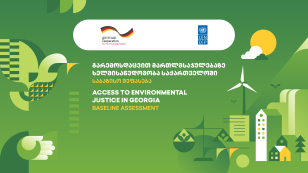Access to Environmental Justice in Georgia. 2023
Access to Environmental Justice in Georgia. 2023
October 25, 2023
A comprehensive study, commissioned by UNDP and Germany and conducted by a team of international and Georgian researchers, promotes environmental justice in Georgia by assessing the legislative and practical landscape, pinpointing specific challenges, and presenting recommendations for various institutions.
The findings are based on desk research and 27 in-depth interviews with various state and non-state representatives, aiming to gather background information, statistics, and insights.
The study reveals that Georgia has a well-established legal framework for environmental justice. The Aarhus Convention is directly applicable, and the Constitution firmly enshrines the right to a healthy environment, emphasising access to information and public participation. Additionally, Georgia's legislation allows anyone to seek judicial remedies for violations of environmental laws. The country boasts functioning administrative agencies and judicial bodies, making both procedural and substantive challenges to environmental decisions possible.
Barriers are described, however, that hinder access to environmental justice in Georgia, giving citizens the feeling that they cannot achieve effective legal remedies for environmental issues through conventional channels.
Barriers to environmental justice are both systemic, like lengthy delays in court reviews that can deny justice, and case-specific, such as shortage of qualified judges or too narrow interpretations of national laws that together can harm the right to a clean, healthy, and sustainable environment.
Additional barriers mentioned in the research include a lack of accessible and inclusive public hearings for infrastructural and other development projects that affect the environment and cases where requests for information are either ignored or answered inadequately.
The recommendations offered encompass the improved enforcement of environmental legislation, timely judicial reviews and procedures, capacity-building of the rule of law institutions and public agencies, public awareness raising, the availability of quality legal aid, and support for civil society.
Authors: Ketevan Vardosanidze, Csaba Kiss
Editing Team: Levan Asatiani, Sean O’Connell, Ivane Chitashvili

 Locations
Locations





